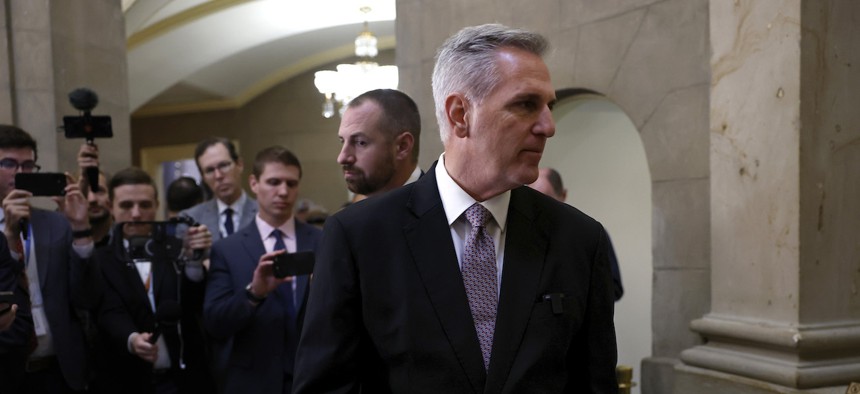
Rep. Kevin McCarthy, R-Calif., speaks to reporters outside of his office after arriving at the U.S. Capitol Building on Oct. 02, 2023 in Washington, D.C. Later that day the House voted to remove him as speaker. Anna Moneymaker/Getty Images
The next shutdown deadline is looming as Congress languishes after McCarthy’s ouster
An already tight timeline is condensed with half of Congress being effectively incapacitated.
Congress has less than six weeks to come up with a funding plan before a current stopgap spending expires, though the House is mired in chaos following the ouster of former Speaker Kevin McCarthy, R-Calif.
The chamber has gone into recess until next week as Republicans attempt to sort out who will run to replace McCarthy and when that vote will take place, delaying negotiations over appropriations bills that leaders had promised would be a top priority. Congress narrowly avoided a shutdown over the weekend after it passed a continuing resolution to keep agencies open through Nov. 17.
Already on Wednesday key lawmakers were warning they faced a tight timeline to approve spending bills, which has now been further condensed as the House is rendered inoperative without a speaker.
“We find ourselves in a dangerous situation,” Senate Majority Leader Chuck Schumer said on the floor Wednesday. “With about 40 days to go before the government shuts down, the House has ground completely to a halt. Until Republicans stop their infighting, the House can vote on no bills, no appropriations work can get done.”
Rep. Patrick McHenry, R-N.C., is serving as speaker pro tempore. Though the situation is unprecedented and has triggered some debate, legislative rules appear to limit McHenry to only facilitating new speaker votes. Schumer suggested this has left Congress vulnerable to inaction if a crisis were to arise and called on Republicans to avoid going down the same path that led to a small number of conservatives rebelling against McCarthy.
“Whoever the House elects as speaker will not be able to ignore the realities of divided government, no matter what the hard right demands,” Schumer said. “The need for bipartisanship will not change. We’ll need bipartisanship to keep the government open. We will need it to finish the appropriations process.”
The House has so far approved four of the 12 spending bills—those funding the departments of Defense, Homeland Security, Veterans Affairs and State—Congress must pass annually, though it did so along party lines. Just before the House voted to vacate the speaker on Tuesday, it approved the rules for debate on the funding bills for the Energy Department and the legislative branch. All of those measures, however, cannot realistically pass the Senate as they are capped at funding levels significantly below those House Republicans agreed to as part of the Fiscal Responsibility Act.
The Senate has yet to approve any of its spending bills, though all 12 have won broad bipartisan support at the committee level. Unlike the House versions, the Senate measures comply with the spending caps President Biden and House Republicans set in their deal to raise the debt ceiling. The chamber has been seeking to move a “minibus” of three of its funding bills, but ran into hurdles as a few individual Republican senators have objected to their consideration.
Sen. Patty Murray, D-Wash., who chairs the Senate Appropriations Committee, said this week after Congress averted a shutdown, that the House and Senate "need to do the hard work of negotiating" over full-year spending bills. She expressed optimism the chamber could begin moving its appropriations packages "in the next few days"—though the Senate is about to go on a week-long recess—and then go to conference with the House to come up with final bills. That approach, she said, would help avoid another CR or an omnibus package that lumps all of the spending measures together, an outcome Republicans have repeatedly stated they want to avoid.
Senate Minority Whip John Thune, R-S.D., said if the Senate does not act quickly on appropriations bills, Congress will wind up in a "terrible position."
"I hope Sen. Schumer will make this the number one priority," Thune told reporters on Wednesday. "We shouldn't be doing anything else right now but dealing with appropriations bills as they have been reported out of the Senate Appropriations Committee. We have until Nov. 17."
Margaret Spellings, president of the Bipartisan Policy Center, on Tuesday noted the House must act quickly to make itself functional again so it can get to work avoiding a November shutdown.
“Congress has just 44 days to negotiate a spending agreement to avoid a government shutdown, and there are numerous other issues that affect our economy and our national security which need to be addressed in the coming months,” Spellings said. “The American people need and deserve a functioning and capable House of Representatives.”
Senate Minority Leader Mitch McConnell, R-Ky., said the "obvious" next step for Congress for the House to approve a speaker, but "job one for the Senate" is to focus on appropriations.
As of Wednesday afternoon, two House Republicans had thrown their names into contention to replace McCarthy: Majority Leader Steve Scalise, R-La., and Judiciary Committee Chairman Jim Jordan, R-Ohio.







